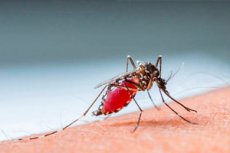New publications
New malaria vaccine shows high protection in clinical trial
Last reviewed: 02.07.2025

All iLive content is medically reviewed or fact checked to ensure as much factual accuracy as possible.
We have strict sourcing guidelines and only link to reputable media sites, academic research institutions and, whenever possible, medically peer reviewed studies. Note that the numbers in parentheses ([1], [2], etc.) are clickable links to these studies.
If you feel that any of our content is inaccurate, out-of-date, or otherwise questionable, please select it and press Ctrl + Enter.

Researchers from Leiden University Medical Center and Radboud Medical Center in the Netherlands have conducted a small clinical trial that demonstrated the safety and effectiveness of a malaria vaccine based on a genetically modified parasite, Plasmodium falciparum. The results of the study were published in the New England Journal of Medicine.
Context and purpose of the study
Malaria affects more than 200 million people each year, killing about 500,000. Most deaths occur in sub-Saharan Africa, Asia and Latin America, and children and pregnant women remain the most vulnerable. Despite efforts to eradicate the disease, existing vaccines provide only short-term protection.
The developers focused on an alternative approach - vaccination using live, weakened parasites (Plasmodium falciparum). This method involves a broader immune response by exposing the immune system to multiple parasite antigens.
Study design
The clinical trial assessed the safety, tolerability and efficacy of a vaccine using a genetically modified GA2 parasite. This parasite is able to develop in liver cells at later stages, which provides a longer and more complete effect on the immune system.
- Participants: 25 healthy adults with no previous exposure to malaria were randomly assigned to one of three groups:
- Group GA2 (10 people) – immunization with genetically modified parasite GA2.
- Group GA1 (10 individuals) is another variant of the parasite.
- Placebo group (5 people) - bites from uninfected mosquitoes.
- Procedure: Participants received three vaccination sessions 28 days apart, each consisting of exposure to 50 mosquito bites. Three weeks after the final vaccination, all participants underwent controlled malaria challenge.
Key Results
- Safety: All groups showed a similar side effect profile, including mild local reactions (redness and itching at the site of mosquito bites).
- Efficiency:
- 89% of participants in the GA2 group (8 out of 9) showed protection against infection.
- Only 13% of participants in the GA1 group (1 in 8) and none in the placebo group avoided infection.
- Immune response:
- Participants in the GA2 group had an increased frequency of P. falciparum-specific CD4+ T cells that demonstrated a pronounced proinflammatory response (production of interferon-γ, TNF-α, and interleukin-2).
- The antibody response to P. falciparum was similar in the GA2 and GA1 groups, indicating that the protection provided by GA2 is due to cellular rather than humoral immunity.
Conclusions and Prospects
The study demonstrated that the GA2 parasite-based vaccine is safe, induces a strong cellular immune response and provides significant protection against infection.
The authors stress the need for further research to confirm the vaccine's effectiveness in larger, more diverse populations. If further trials confirm the results, it could be a significant step forward in the fight against malaria.
